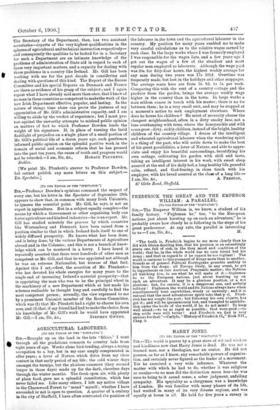AGRICULTURAL LABOURERS.
. [TO THE EDITOR OF THE " snarrron.1 Sfit,—Brought up on the land in the late "fifties," I went Sthrough all, the gradations common to country lads from eight years of age. Weeks alone bird-tending, always a trying occupation to a boy, but in my case amply compensated in after years; a lover of Nature, which dates froin my close contact in that early period of ray life; the cold winter days amongst the turnips, but the glorious summers (they seemed longer in those days) made up for, the dark, cheerless days through the winter months. The fresh open-air, with plenty of plain food, gave me a splendid constitution, which has never failed me. Like many others, I left my native village in the Charnwood.Forest to " mend " myself ; whether I have succeeded or not is open to question. A quarter of 'a, century- in the city of Sheffield, I have often contrasted the position of the labourer in the town and the agricultural labourer in the country. My position for many years enabled me to make very careful calculations as to the relative wages earned by each class. In the large works where I was formerly employed I was responsible for the wages lists, and a few years ago I got out the wages of a few of the steadiest and moat regular men employed as labourers. Although the wage paid was 20s. for fifty-four hours, the highest weekly average for any man during two years was 17s. lOid. Overtime was frequently made, but lost in the holidays and other stoppages. The average rents here are from 3s. 9d. to 5s. per week. Comparing this with the rent of a country cottage and the produce from the garden, brings the average weekly wage higher in the country than in the town. In large works a man seldom comes in touch with his master; there is no tie between them; he is a very small unit, and may be stopped at a moment's notice to seek employment elsewhere. Where does he house his children ? He must of necessity choose the cheapest neighbourhood, often in a dirty smoky lane, not a lane overhanging with trees, where the honeysuckle and wild roses grow ; dirty, sicklychildren, instead of the bright, healthy children of the country village. I dream of the intelligent and educated agricultural labourer when the wandering spirit is a thing of the past, who will settle down to make the beet of his great possibilities, a lover of Nature, and able to appre- ciate and enjoy his beautiful surroundings, beautifying his own cottage, cultivating his garden with skill and taste, taking an intelligent interest in his work, with sweet sleep assured at the end of his daily toil, a long healthy life, peaceful calm, refined, and God-fearing, in close touch with his employer, with his bread assured at the clops of a long life.—


















































 Previous page
Previous page